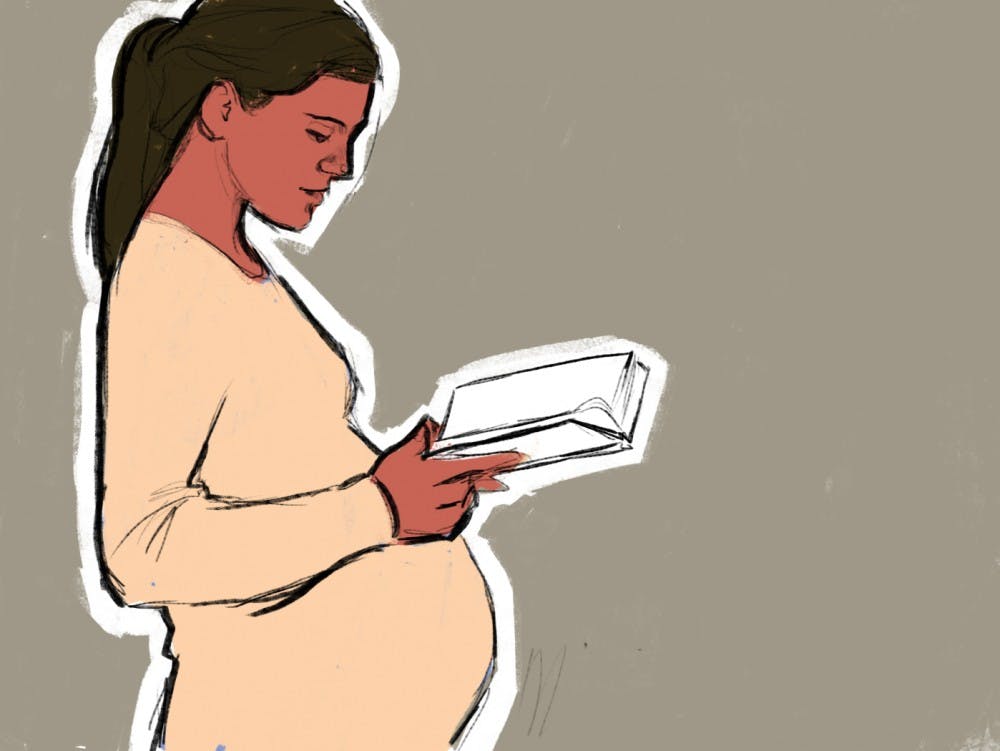
Penn describes its maternity leave options as “family friendly,” but some students disagree, reporting that Penn's policies can be inadequate in supporting women with children.
Gabriela Kattan Khazanov, a sixth-year School of Arts and Sciences Ph.D. student in clinical psychology, gave birth to her first daughter last year. She said Penn’s restrictive maternity leave policies led her to pay for an extra year of school on her own, adding that she believes these policies place mothers at a disadvantage.
Khazanov said she had two options for maternity leave: she could either remain enrolled and keep her stipend, returning in eight weeks, or pause her funding for a longer maternity leave. She said she chose to return after eight weeks, explaining that her annual salary of roughly $30,000 made unpaid leave an unviable option.
But even while she was on this eight-week break, Khazanov felt compelled to do work, she said.
The assignments for Ph.D. students are not like undergraduate quizzes and homework, which usually have shorter timelines. Ph.D. students typically receive funding for a set period — for Khazanov, that's five years — and they're expected to complete a dissertation by the end of that period. Although Khazanov may not have had to attend classes or meet traditional deadlines during her maternity leave, she stressed over losing those eight weeks of paid work.
Khazanov is not the only one in this position. Experts have found that unmarried, childless women fare the best in academia compared to their peers. Not only are they 4 percent more likely to secure tenure-track jobs in academia than unmarried childless men, they’re 33 percent more likely to earn those jobs compared to married women with young children.
Khazanov wasn't eventually able to finish her dissertation after her fifth year, which was her last year of funding. Because Penn's maternity leave policy does not extend funding for graduate students, Khazanov thought for months that she would have to pay her own way through a sixth year to complete her program. Taking on this extra year, she said, is only feasible for students with well-paid spouses or families willing to help.
“Maternity leave doesn’t really mean anything [at Penn],” Khazanov said. “You would think Penn would want to give their grad students the biggest leg up to be successful as academics, and this makes it near impossible.”
OnJuly 10, Khazanov was informed by her graduate chair that extra funding was available in the department, and they were willing to use to pay for her last year of tuition, which is approximately $5,000. However, Khazanov has still had to finance her own living expenses, which can be as high as $30,000.
Khazanov believes that maternity policies at Penn need to be improved, but title IX lawyer Avi Kumin and Penn Associate General Counsel Sean Burke said that even though Penn's policies may have flaws, they abide by legal standards.
In an emailed statement, Burke said the Title IX laws prohibiting sex discrimination in education do not require institutions to provide maternity leave, though those that offer it must grant the same policies to students taking time off for other medical reasons. Kumin added that these policies stem from the Family and Medical Leave Act, which requires employers to grant, at minimum, unpaid time off.
Burke added that one of the maternity leave options — the eight-week “paid leave” — is exclusive to student-parents and unavailable to other medically-excused students, so in theory, Penn actually exceeds Title IX requirements.
Kumin agreed with Khazanov that this structure may require students to work during leave but said it’s still in line with the law.
“That’s not terribly fair,” he said, “but they’re not being discriminatory.”
Some peer institutions such as Cornell University and Columbia University, do not grant additional benefits for student-parents, but others such as Princeton University and Yale University do. Yale grants an extra funded semester, as does Princeton, which provides one additional term per child.
Given that students planning to have children while continuing their education at Penn may face additional challenges, some work to avoid this by waiting to have children only after completing their degrees.
2014 School of Arts and Sciences Ph.D. graduate Ruth Erickson said she planned for the birth of her first child to coincide with the end of her dissertation. In fact, she wound up giving birth just two weeks after she handed it in. She said most of her peers made similar decisions and that her academic advisor was understanding of her pregnancy.
“Any time, having a career and having children is some type of balance,” Erickson said. “It feels like there’s sacrifices made on both sides, but you just do the best you can.”
The Daily Pennsylvanian is an independent, student-run newspaper. Please consider making a donation to support the coverage that shapes the University. Your generosity ensures a future of strong journalism at Penn.
Donate







